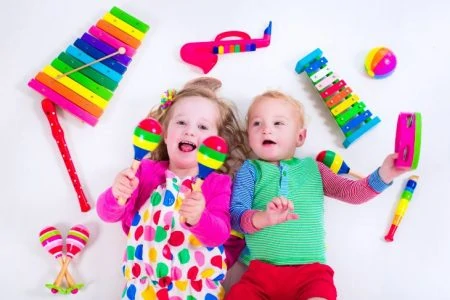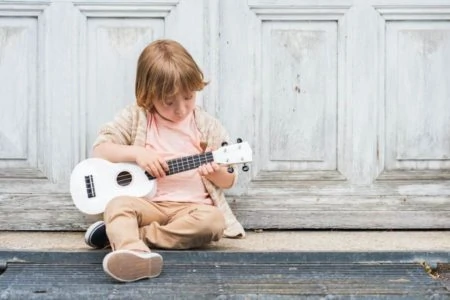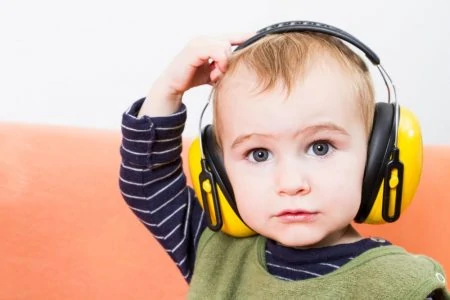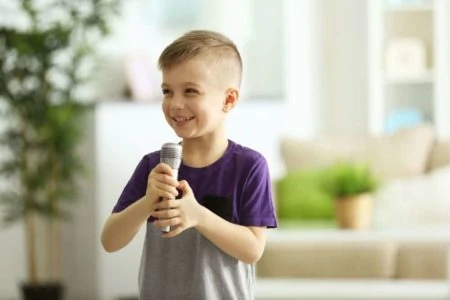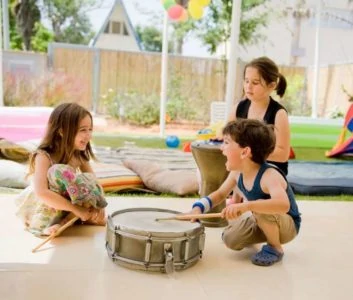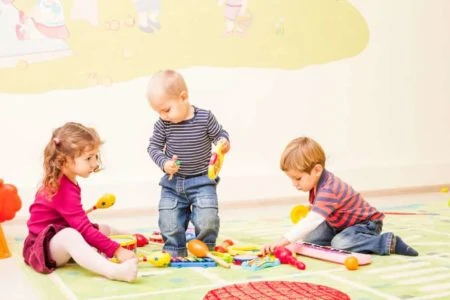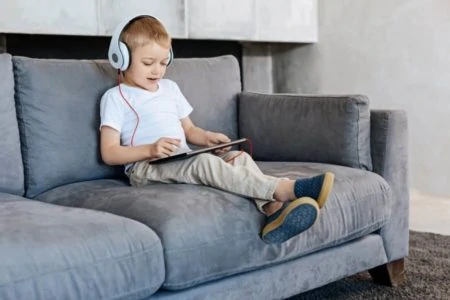You have probably heard that Mozart makes babies smarter, or that learning piano helps with math. It turns out, the rumors are true.
Music is a powerhouse for child development. From soothing a fussy infant to teaching a teenager discipline, musical engagement builds brain pathways that last a lifetime.
If you are curious about how tunes translate to milestones, we have the breakdown on why music matters and how to safely introduce it at every stage.
Benefits of Music for Babies
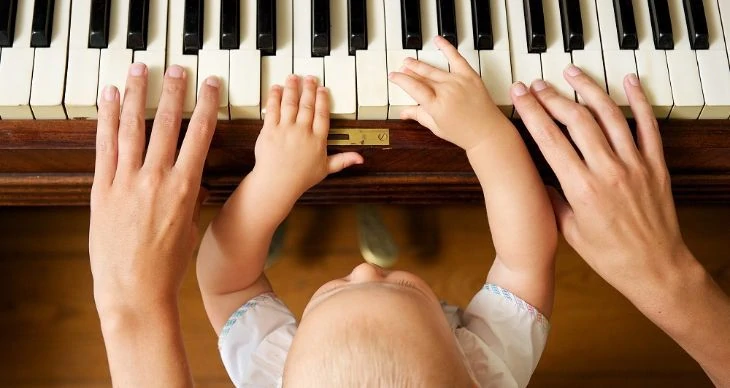
Newborns are hardwired to process sound. Before they understand words, they understand rhythm and tone. While popping on a playlist is great, singing to your baby creates a powerful connection that passive listening cannot match.
Here is why incorporating melodies into your infant’s routine is a smart move:
[list style=”heart”]- Language acquisition: Infants recognize musical patterns long before they speak. This recognition lays the groundwork for understanding speech patterns and sentence structures (1).
- Non-verbal communication: When you sing to your baby, they watch your mouth and eyes. They learn to interpret facial expressions and emotional cues, which are the building blocks of social interaction.
- Emotional regulation: A lullaby does more than put a baby to sleep; it teaches them how to self-soothe. Hearing a parent’s voice modulate through song helps them understand and manage their own emotional states.
- Soothing preemies: Research suggests that live music and soft lullabies can improve vital signs in premature infants. It also empowers parents in the NICU to feel more connected to their fragile little ones.
- Cognitive boosts: Music engages memory and pattern recognition. Studies show that babies as young as eight months can recognize snippets of songs weeks after hearing them.
- Stress reduction: Familiar songs act as a security blanket. Playing a specific song during diaper changes or bedtime creates a sensory cue that lowers cortisol levels and signals safety.
- Better sleep hygiene: It is not a myth; babies sung to by caregivers tend to have better sleep patterns and stay asleep longer (2).
- Fine motor skills: Babies are naturally drawn to objects that make noise. Grasping a rattle or banging on a toy drum helps refine hand-eye coordination and grip strength.

While the benefits are huge, safety is paramount. You must protect your baby’s delicate ears. Keep stereo volume low and avoid using headphones on infants unless they are specifically designed for noise cancellation during loud events.
8 Tips for Introducing Music to Babies
You do not need to be a professional vocalist to get your baby grooving. If you are looking for fresh ways to make noise together, try these simple interactions.
[list style=”number-blue”]- The pause method: When singing a familiar song, stop suddenly at a key moment. Wait for your baby to coo, kick, or smile before you finish the line. This teaches them about anticipation and turn-taking (3).
- Tactile exploration: Use a baby piano or sensory shakers. Guide their hands to touch the keys or shake the rattle, showing them that their actions create the sound.
- Bedtime cues: Use specific songs strictly for sleep. A musical baby mobile or a specific lullaby signals to the brain that it is time to wind down.
- Genre hopping: Don’t limit the playlist to “Twinkle Twinkle Little Star.” Play classical, jazz, soft rock, or reggae. Exposure to complex rhythms aids brain development.
- Rhyme time: Nursery rhymes are catchy for a reason. The repetitive rhyming structure helps babies detect phonetic segments, which is crucial for eventual reading skills.
- Read the room: Pay attention to your baby’s cues. If they turn away or get fussy, the music might be too loud or overstimulating. If they kick and smile, keep going.
- Active bonding: Don’t just leave music on in the background. Sing to them. Eye contact releases oxytocin, bonding you two together while the music stimulates their brain.
- Movement matters: Hold your baby and dance gently. Marching, swaying, or bouncing to the beat helps develop their vestibular system (balance and spatial orientation).
Benefits of Music for Toddlers and Preschoolers

Once your child is mobile, music takes on a whole new life. This is the age of “The Wiggles” and “Baby Shark.” Be prepared to hear the same songs on an infinite loop.
While the repetition might test your patience, remember that toddlers thrive on predictability. Knowing what lyric comes next gives them a sense of control and confidence.
Here is how those catchy tunes are helping your toddler grow:
[list style=”heart”]- Gross motor development: Dancing to music engages the large muscle groups. Jumping, spinning, and stomping to the beat improves balance, strength, and spatial awareness.
- Coordination boost: Trying to clap to a beat or bang a drum in time requires the brain and body to sync up. This rhythmic coordination translates to better performance in sports later on.
- Emotional outlet: Toddlers often lack the words to say “I’m frustrated.” Aggressively banging a drum or dancing wildly allows them to release pent-up energy and regulate their mood.
- Social bonding: Singing songs together creates a shared experience. It turns a boring car ride into a party and builds a family culture of fun and connection.
- Routine reinforcement: Clean-up songs or teeth-brushing songs make transitions easier. Music triggers muscle memory, helping toddlers move through their day with fewer meltdowns.
- Vocabulary expansion: Songs often contain words we don’t use in daily conversation. Learning lyrics introduces new vocabulary in a context that makes the meaning easy to remember.
- Cultural connection: Teaching your child songs from your own childhood or heritage passes down family history. It creates a sense of belonging and identity.
- Empathy building: Making music in a group requires listening to others. Studies indicate that synchronized musical activities increase helpful behavior and empathy in young children (4).
- Sensory integration: Music combines hearing with feeling (vibrations) and seeing (movement). This multi-sensory experience helps the brain organize and process information (5).
- Literacy foundations: When you sing nursery rhymes, you are teaching phonemic awareness. Recognizing that “cat” rhymes with “bat” is a precursor to learning to read.
- Math readiness: Music is math in motion. Beats, measures, and rhythms are essentially patterns and fractions. Early musical exposure primes the brain for mathematical logic.
Ideas for Introducing Music to Toddlers
Toddlers are natural performers. They do not care about being on key; they just want to be loud and involved. Here is how to channel that energy.
[list style=”number-blue”]- Action songs: Use songs that command movement, like “Head, Shoulders, Knees, and Toes.” This connects the auditory instructions to physical body parts.
- Prop box: Enhance the imagination by adding props. Scarves, stuffed animals, or pillows can turn a song into a theatrical performance (6).
- DIY instruments: You don’t need expensive gear. A wooden spoon and a plastic bowl make a great drum kit. A toilet paper roll filled with rice makes a shaker.
- Embrace repetition: Let them play that one song again. And again. Repetition solidifies learning and memory pathways in the toddler brain.
- Keep it low pressure: Avoid forcing formal lessons too early. At this age, the goal is exposure and enjoyment, not mastering scales.
- Sing without shame: Your child thinks you are a rockstar. Sing loud and proud, regardless of your pitch. Your confidence teaches them to be confident.
- The bell game: Tie small bells to their wrists or ankles. Challenge them to move only one arm or one leg to make a sound. This builds body awareness and control.
- Daily doses: Make music a habit. A wake-up song, a clean-up song, and a bedtime song provide structure to the day.
- Humming challenge: Sing a favorite song but replace the words with humming. Ask your child to guess the song. This trains their ear to recognize melody separate from lyrics.
- No critics allowed: Never critique their singing voice or rhythm. Correction kills creativity. Applause encourages it.
- Involve caregivers: Ensure your nanny or daycare knows your child’s favorite jams. Consistency across environments helps your child feel secure.
Benefits of Music in Schools
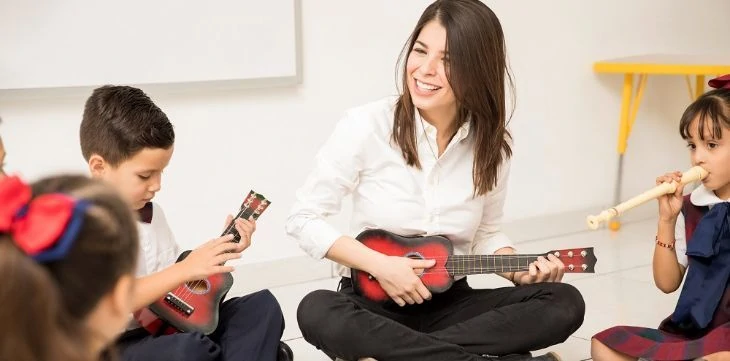
As children enter school, the debate often shifts to “Band or Sports?” The truth is, music education offers many of the same benefits as athletics, plus some unique cognitive perks.
Learning an instrument is a full-brain workout. It requires the visual, auditory, and motor cortices to fire simultaneously.
Here is why fighting for music education in your child’s schedule is worth it:
[list style=”heart”]- Whole brain activation: Playing music engages both hemispheres of the brain. This strengthens the corpus callosum, the bridge between the two sides, improving overall mental processing.
- Refined coordination: Reading notes and translating them into finger movements improves hand-eye coordination and fine motor dexterity.
- Deep focus: You cannot daydream while playing in an orchestra. Music teaches children to maintain intense concentration for extended periods.
- Grit and patience: Mastery requires failure. Kids learn that they will hit sour notes, and the only way to fix it is through repetition. This builds resilience.
- Joy and release: For many students, the music room is a sanctuary. It provides a creative escape from the pressures of standardized testing and social cliques.
- Confidence boost: Mastering a difficult piece provides a massive sense of achievement. It proves to the child that hard work yields tangible results.
- Academic crossover: The discipline learned in practice often spills over into homework habits. Musicians are accustomed to breaking big tasks into small, manageable chunks.
- Conquering stage fright: Recitals teach kids how to manage anxiety and perform under pressure. This is excellent preparation for public speaking in adulthood.
- Language processing: Music training enhances the brain’s ability to process subtle sound distinctions, which correlates with better reading and foreign language skills.
- Stress management: Playing music can be meditative. It allows kids to “zone out” of their worries and focus entirely on the sound.
- Social belonging: Band, choir, and orchestra provide an instant social circle. These groups often foster a supportive, non-competitive environment where everyone works toward a common goal.
- Collaboration: In a band, you have to listen to your peers. If one person plays too loud, the song falls apart. This teaches teamwork in a way few other subjects can (7).
- Multitasking mastery: A musician reads music, watches the conductor, listens to the pitch, and moves their hands all at once. It is the ultimate multitasking training.
- IQ benefits: Studies have linked music lessons to small but significant increases in IQ, particularly in areas related to executive function (8).
- Spatial-temporal reasoning: This is the ability to visualize patterns and how they fit together. It is a critical skill for advanced math, engineering, and architecture.
- Test performance: Data consistently shows that students involved in high-quality music programs tend to score higher on standardized tests, likely due to increased focus and processing speeds.
- Memory enhancement: Memorizing music reinforces the brain’s memory centers. This skill is easily transferable to memorizing facts for history or science.
- Career potential: Even if they don’t become rockstars, the creative and disciplined mindset of a musician is highly valued in many modern career paths.
7 Tips for Choosing the Right Instrument
So your child wants to play, but which instrument fits? Here is how to navigate the choice.
[list style=”number-blue”]- Follow their passion: If they are obsessed with the violin, do not force the trumpet. Interest is the fuel for practice. However, note that piano and guitar are the most versatile for lifelong playing.
- Consider the budget: Instruments range from affordable to astronomical. Do not break the bank on a first instrument; rentals are a great option for beginners.
- Check the logistics: Do you have space for a drum kit? Can you transport a double bass to school? Practicality matters.
- Volume control: If you live in an apartment, drums might be a problem. Electronic versions with headphones can be a marriage-saver.
- Genre match: A child who loves heavy metal might be bored by the clarinet. Match the instrument to the music they actually listen to. Guitars are great for rockers.
- Test drive: Visit a local music shop or ask the school teacher if your child can hold and try a few instruments. Sometimes the “cool” instrument feels awkward to hold, and a different one feels right.
- Singers need accompaniment: If your child loves to sing, steer them toward piano or ukulele. These allow them to accompany themselves, which is a huge motivator.
FAQs
The Bottom Line
Encouraging a love for music sets your child up for a lifetime of benefits, from sharper math skills to better emotional regulation.
The goal isn’t to raise a prodigy; it is to raise a happy, well-rounded human. Whether you are banging on pots and pans with a toddler or cheering on a teenager at a band recital, keep it fun.
Lead by example. If you enjoy the music, they will too. So turn up the volume and have a dance party, it’s good for both of you.
